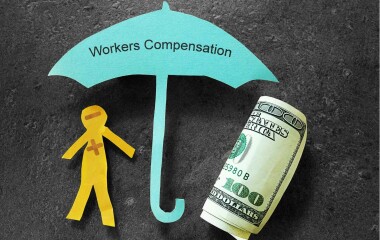If you have suffered a work-related injury, you are likely interested in understanding the taxation of the compensation you receive. Are you required to pay income tax on the compensation awarded? Which types of compensation are exempt from tax, and which are not? This article provides a comprehensive overview of the tax implications of compensation for occupational injuries in the Czech Republic.
Principles of Taxation of Compensation for Occupational Injuries
It is essential to be familiar with the precise rules applicable to different types of compensation to avoid potential misunderstandings when dealing with the tax authorities. The fundamental rule in the taxation of compensation for occupational injuries is that compensation related to work injuries is taxed according to the type of compensation claim.
Tax-Exempt Compensation for Occupational Injuries
Certain types of compensation are exempt from income tax. This exemption is based on Act No. 586/1992 Coll., on Income Taxes, which in Section 4 defines income exempt from taxation. These exemptions generally concern compensation for damages inherently related to injury to health. The most common examples include compensation for pain and suffering, diminished ability to participate in social life, and reimbursement of medical treatment expenses.
Non-Exempt Compensation for Occupational Injuries
However, you are not entirely exempt from income tax. Some payments must be subject to taxation. These typically involve income that is generally subject to income tax and social security and health insurance contributions. This especially includes wages, supplements from employee commercial insurance, severance pay, and other components of employee remuneration. The employer is responsible for fulfilling the tax and contribution obligations in cases of occupational injuries.
Taxation of Specific Types of Compensation for Occupational Injuries
-
Taxation of Compensation for Loss of Earnings During Temporary Work Incapacity
If you are temporarily unable to work due to an occupational injury, you are entitled to compensation for loss of earnings. This compensation represents the difference between your average earnings before the injury and the full amount of sickness benefits.
Tax regime: This compensation is not exempt from income tax pursuant to Section 4(1)(d)(1) of the Income Tax Act.
-
Taxation of Compensation for Loss of Earnings After the End of Temporary Work Incapacity
After the end of temporary incapacity, an employee may continue to suffer consequences of the injury preventing them from earning the same income as before the injury. In such cases, they are entitled to compensation for loss of earnings after the temporary incapacity (so-called pension or annuity).
Tax regime: This form of employee compensation is not exempt from income tax under Section 4(1)(d)(1) of the Income Tax Act.
Note: If the annuity is paid from another source (e.g., commercial accident insurance), it is also subject to taxation, as per the exception specified in the cited provision.
-
Taxation of Compensation for Pain and Suffering and Diminished Ability to Participate in Social Life
Compensation for pain and suffering (pain and suffering allowance) represents a lump sum payment for pain caused by the occupational injury and its treatment.
Compensation for diminished ability to participate in social life compensates for permanent consequences limiting the injured party’s ability to engage in everyday life. This covers the negative impacts on the employee’s life caused by the occupational injury (this claim expires upon the employee’s death).
Tax regime: Both types of compensation are exempt from income tax pursuant to Section 4(1)(d) of the Income Tax Act.
-
Taxation of Reimbursement for Reasonably Incurred Medical Expenses Related to Occupational Injury
This concerns expenses not covered by health insurance, such as premium medical aids, non-reimbursed medications, rehabilitation beyond the scope of insured care, etc.
Tax regime: Such reimbursements are exempt from income tax under Section 4(1)(d) of the Income Tax Act.
-
Taxation of Compensation for Property Damage from Occupational Injury
Property damage includes damage to or destruction of the employee’s personal belongings in connection with the occupational injury (e.g., clothing, watches, mobile phones).
Tax regime: Compensation for property damage is exempt from income tax pursuant to Section 4(1)(d) of the Income Tax Act.
-
Taxation of One-Time Compensation to Survivors in the Event of Employee Death
In the event of death due to occupational injury, survivors are entitled to a one-time compensation payment.
Tax regime: This compensation is exempt from income tax pursuant to Section 4(1)(d) of the Income Tax Act.
Specific Cases of Taxation of Employee Compensation Related to Occupational Injuries
If compensation for occupational injury damage is awarded by court decision and includes interest on late payments, it is important to note that while the principal compensation is tax-exempt, the interest on late payments is subject to income tax (15% withholding tax).
In out-of-court settlements, it is crucial that the agreement clearly specifies the nature of the compensation. If the compensation differs from the types explicitly exempted by law, it may be subject to taxation.
Practical Advice for Employees in Cases of Occupational Injury
-
Request Detailed Breakdown of Compensation
Always insist on a detailed itemization of compensation components when receiving compensation for an occupational injury. Each part should be clearly identified and labeled, facilitating proper tax treatment.
-
Keep All Relevant Documentation
For possible audits by tax authorities, retain all documentation related to the occupational injury and compensation for at least 10 years, including:
-
Consult a Tax Advisor for Complex Cases
In complex situations (e.g., multiple types of compensation, foreign payments, large sums), consulting a tax advisor is recommended to obtain tailored advice.
-
Don’t Forget Tax Returns
Even though many compensations are tax-exempt, you may still be required to file a tax return, for example if you have other taxable income or if part of the compensation (such as interest) is taxable.
Frequently Asked Questions on Taxation of Occupational Injury Compensation
No, tax-exempt income does not need to be reported. However, it is advisable to keep documentation proving exemption in case of tax authority inquiries.
Yes, compensation for occupational diseases follows the same tax rules as compensation for occupational injuries.
No, there is no tax difference regardless of whether the compensation is paid directly by the employer or the statutory insurance company with which the employer holds liability insurance.
Employee Rights
Taxation of compensation for occupational injuries offers injured employees a significant degree of tax exemption. Virtually all standard compensations related to occupational injuries are exempt from income tax.
Nevertheless, it is important to know the exact rules and keep all relevant documentation. In case of doubts, consultation with a tax expert is advisable to navigate your specific situation.
Contact Právo zaměstnance
📞 Phone: +420 773 014 007
📧 Email: info@pravozamestnance.cz
🏢 Contact via form on the website
Social media: Instagram, Facebook or LinkedIn
We protect and enforce employees' rights and strive to improve working conditions in the Czech Republic. We also support you in dealing with occupational injuries. For news, advice, and tips on employee rights, visit our blog or follow us on Instagram, Facebook or LinkedIn. Thank you.





